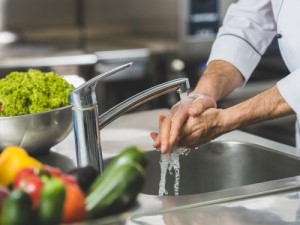Meigs Health Today: E. Coli, What you Need to Know

Proper hand washing helps to prevent foodborne illnesses. Submitted photo.

Meigs Health Today: E. Coli, What you Need to Know
E. Coli (Escherichia Coli), are a large group of bacteria that naturallylive in the intestines of people and animals, especially cattle. Most types of E. Coli are harmless and some are actually beneficial to our guts. However, there are a few that cause illness when encountered. According to the CDC, some kinds of E. Coli can cause diarrhea, while others cause urinary tract infections (UTI), respiratory illness and pneumonia, and other illnesses.
The most common E. Coli, the one that causes foodborne illness, is typically spread via the fecal-oral-route. This is when infected feces end up in the mouth. This can happen when a person doesn’t wash their hands properly after using the restroom then deposits the germ on surfaces or directly on food. If E. Coli is on a door knob and you touch it, now E. Coli is on your hands. If you then eat, with your hands, without washing them first, you will transfer the germs to your food and eat them. Another way E. Coli travels the fecal-oral- route is when water is tainted by feces then used for drinking or irrigation. According to the FDA, the large E. Coli outbreak related to romaine lettuce last year is suspected to be caused by a cattle farm that allowed runoff from their feed lot to enter a reservoir. Water from that reservoir was then used to irrigate the lettuce. A third possible fecal-oral-route includes swallowing water while swimming in an infected body of water, or from a well that has been contaminated by human or animal sewage.
Once E. Coli is consumed it can take 1 to 10 days to develop symptoms. However, most people experience symptoms in 3-4 days. Symptoms of Foodborne illness caused by E. Coli are typically stomach cramps, diarrhea (often bloody), and vomiting. As with all germs, the elderly, sick, and very young are more likely to develop illness once exposed.
Non-foodborne illness related to E. Coli bacteria can be spread in other ways. UTI infections are typically spread by improper wipingafter using the restroom. Respiratory illness and pneumonia are usually secondary infections that occur after the original infection has progressed.
According to the CDC, Key ways to prevent an E-Coli infection include:
- Wash hands after using the restroom and before eating or preparing food.
- Rinse all produce thoroughly.
- Cook meats to their required temperatures, 145 will kill E-Coli.
- Avoid unpasteurized juices and dairy products.
- Prevent cross contamination of cooking equipment by thoroughly washing all equipment that contacts raw meats.
- Avoid swallowing water while swimming.









